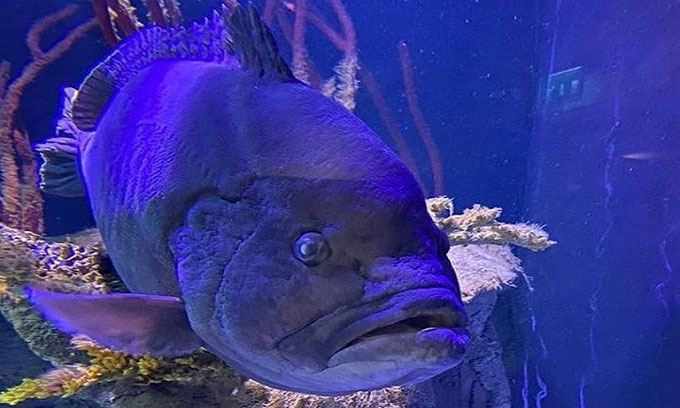The one-meter-long grouper that lived on its own had shown depression since the aquarium closed, leaving staff to find ways to make it happy.
A frowning grouper named Mikko in the Sea Lab marine lab at Sea Life Helsinki Aquarium in Finland has expressed his displeasure that the facility has temporarily not welcomed visitors due to Covid-19. Therefore, the staff organized a birthday party for it. Mikko misses visiting the aquarium as she has no companions in the aquarium as she always eats the neighbors.

Since closing the gate in the spring to prevent outbreaks, Mikko’s caregivers have noticed that the solitary fish appear lethargic and indifferent despite their condition. To brighten up the fish, they made a special salmon cake to celebrate its 16th birthday. In the video shared by the aquarium on Facebook on October 12, Mikko enthusiastically ate all the gifts as she did not have to share with any animals.
Joining the aquarium in 2007, Mikko is a huge fish, one meter long and weighing around 16 kg. The pet store donates the fish to the aquarium because it is bigger than all of its aquariums and constantly eats its friends. In the aquarium Mikko is fed 3-4 times / week a diet that includes squid and small fish such as herring, cod or termites.
But it still exhibits a voracious nature with all the animals in the same tank. Mikko once devoured a poisonous lionfish. Mikko is not the only grouper who enjoys large, dangerous prey. Previously, scientists had noted that many groupers devoured sharks.
After the lionfish accident, the caregiver moved Mikko to a private tank. Without companions, he appears “depressed” in the absence of visitors to the aquarium. “In order to keep the morale of the fish during the closure, the aquarium staff have lunch and a coffee break near their aquarium. They rub it with a soft brush to stimulate it. watch TV, ”said the aquarium representative.
However, personnel should be very careful when using the brush. In December 2019, Mikko snatched a paintbrush from an employee’s hand and swallowed it. The brush got stuck in the fish’s throat, forcing the vet to anesthetize it to remove the object.
Biologists have found that fish can exhibit depression. For example, in the experiment, the zebrafish curled up and did not like the stimulation. They also often float near the bottom of a tank, according to the team from the University of Troy, Alabama. During this time, the fish are happily active and spend more time swimming closer to the water.
https://khoahoc.tv/


